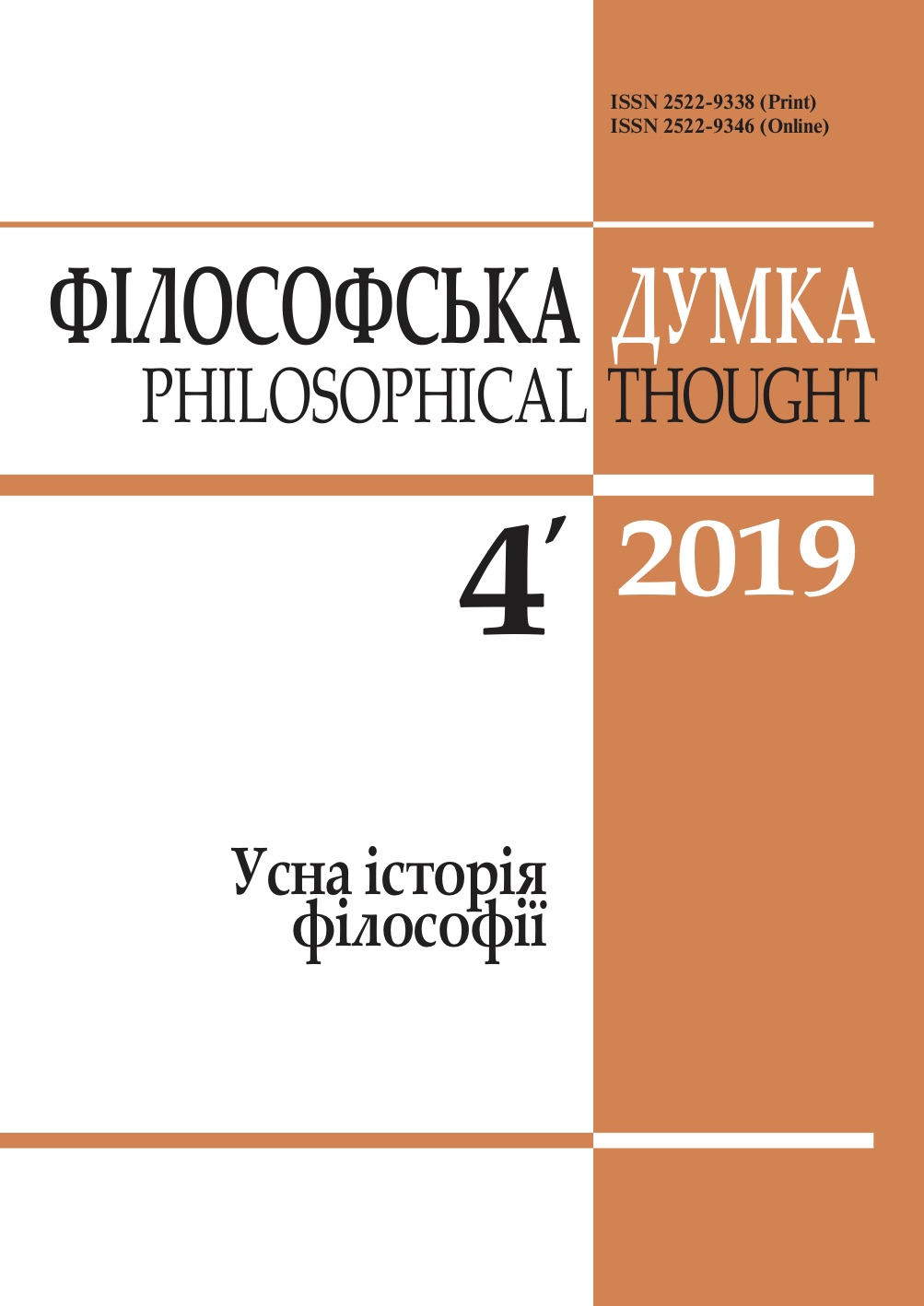The limits of certainty in the oral history of philosophy: the problem of memory
DOI:
https://doi.org/10.15407/fd2019.04.067Keywords:
interview, cognitive bias, memory, philosophy, philosophical textAbstract
The article argues that the oral history of philosophy (OHP) will not produce reliable results unless it develops effective methods of counteracting cognitive biases related to human memory. So far, this problem has not even been raised.
I highlighted the main cognitive memory biases that affect the validity of the UIF: choice-supportive bias, hindsight bias, fundamental attribution error. Describing the nature of their detrimental effects on the interview, I suggested ways to counteract it: (1) multi-level verification of all actual data; (2) checking of the interview's previous judgment; (3) mandatory data validation for the potential impact of nostalgia; (4) co-creation interviewing; (5) a sequence of questions that will problematize the possible impact of bias during the interview itself.
As OHF is still a theoretically unspecified discipline, I have proposed a concept that includes (a) its definition, (b) its place among other historical and philosophical disciplines, (c) its main genres and their specificities; (d) the irreplaceability of its data for the history of philosophy as a science (the ability to engage the interviewer in an active non-self-reflection situation). Interviewer answers often cannot be obtained from traditional sources (articles, books, drafts, letters, margins, etc. ).
In the end, I outlined five main arguments in favor of the broad involvement of students of the philosophical faculties in organizing and conducting interviews within the OHF.
References
Brandom, R. (1999). Interview [with Carlo Penco]. Retrieved from http://www.dif.unige.it/epi/hp/penco/pub/brandom_inter.pdf
Brandom, R. B. (1994). Making it explicit : reasoning, representing, and discursive commitment. Cambridge, Mass : Harvard University Press.
Mather, M., Shafir, E., & Johnson, M. K. (2000). Misrememberance of options past: Source monitoring and choice. Psychological Science , 11(2), 132–138. https://doi.org/10.1111/1467-9280.00228
Myers, D. G. (2009). Social Psychology. New York: McGraw-Hill.
Nora K., Hösle, V. (2000). The Dead Philosophers' Café: an exchange of letters for children and adults. [In Ukrainian]. Notre Dame, Ind.: University of Notre Dame Press. [= Нора К., Гьосле, 2019]
Priend, B., Schweicard, D. P. (Eds.). (2008). Robert Brandom. Analytic pragmatist. Frankfurt a. Main: Ontos Verlag. https://doi.org/10.1515/9783110326246
Ritchie, D. A. (2015). Doing oral history: a practical guide. Oxford: Oxford University Press.
Roese, N. J., Vohs, K. D. (2012). Hindsight bias. Perspectives on Psychological Science. 7(5): 411–426. https://doi.org/10.1177/1745691612454303
Rorty, R. (1984). The Historiography of Philosophy: Four Genres. In R. Rorty, J. B. Schneewind, & Q. Skinner. (Eds.). Philosophy in history: essays on the historiography of philosophy. Cambridge: Cambridge University Press. https://doi.org/10.1017/CBO9780511625534
Wanderer, J. (2008). Robert Brandom. Montreal, Kingston, & Ithaca : McGill-Queen's University Press. https://doi.org/10.1017/UPO9781844653010
Wilke, A., & Mata, R. (2012). Cognitive Bias. In: V. S. Ramachandran (Ed.) The Encyclopedia of Human Behavior (vol. 1, pp. 531-535). Amsterdam et al.: Elsevier. https://doi.org/10.1016/B978-0-12-375000-6.00094-X
Zabala, S. (2008). The Hermeneutic Nature of Analytic Philosophy: A Study of Ernst Tugendhat. New York: Columbia University Press. https://doi.org/10.7312/zaba14388
Downloads
-
PDF (Українська)
Downloads: 493
Published
How to Cite
Issue
Section
License
Authors who publish with this journal agree to the following terms:
- Authors retain copyright and grant the journal right of first publication.
- Authors are able to enter into separate, additional contractual arrangements for the non-exclusive distribution of the journal's published version of the work (e.g., post it to an institutional repository or publish it in a book), with an acknowledgement of its initial publication in this journal.
- Authors are permitted and encouraged to post their work online (e.g., in institutional repositories or on their website) prior to and during the submission process, as it can lead to productive exchanges, as well as earlier and greater citation of published work (See The Effect of Open Access).


